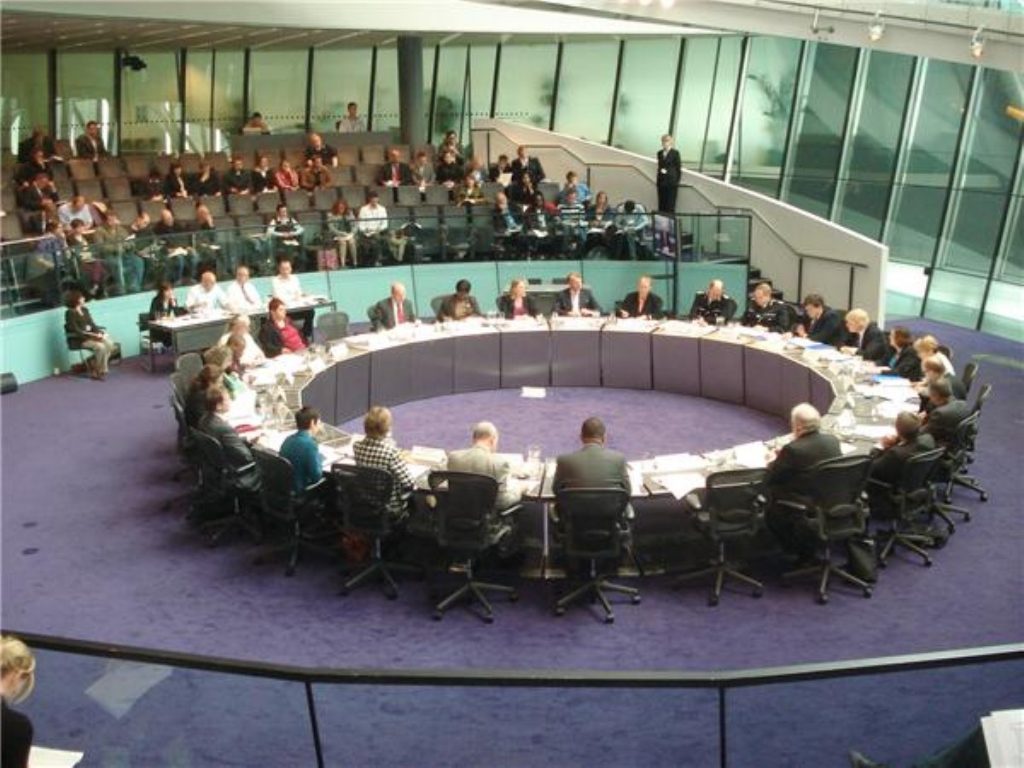Boris establishes G20 civil liberty review
By Ian Dunt
The Mayor of London has established a civil liberties panel whose first task will be to look into the policing of the G20 protests.
The decision came at a public meeting of the Metropolitan Police Authority (MPA) in City Hall today, with demonstrations outside and inside the building.
Jenny Jones, a member of the London Assembly and the Metropolitan Police Authority, described the meeting as “one of those make or break moments in the life of a democratic society” in a comment piece for politics.co.uk today.


In a seperate development today, a Met officer resigned over inappropriate comments on a website about the G20 protest.
The news came as the Met accepted requests to meet with climate camp protesters and include them in any future review.
It also made a clear statement that photographing police officers is legal, and that police cannot require protesters to delete photographs.
A loose coalition of protesters and trade unionists gathered around City Hall from 09:00 BST this morning to keep the pressure up on reform of police tactics, which have come under unprecedented scrutiny since the G20 protests.
Public concern has centred around the use of ‘kettling’, a controversial police tactic where officers seal off an area of protest, refusing anyone entry or exit.
A Met representative who tried to tell assembled members why the police turned the two-way cordon into a kettle faced angry shouts from young activists in the audience.
The heckling grew so loud, Mr Johnson was forced to say: “Heaven knows you have a right to be here but there really is no point in trying to disrupt this.”
The police representative claimed police noticed a group of individuals were in the crowd who intended to cause “real damage”.
“The fear is if they were left unchecked they would have gone on the rampage around the City of London,” he continued.
“We do everything we can to get innocent protesters out. It’s not an easy thing to do. How can you tell the difference?”
This statement prompted a torrent of abuse from sections of the audience, forcing the Mayor to issue another warning.
“I really must tell the audience, if there is one more disruption I will suspend the meeting,” Mr Johnson said.
Thereafter, activists merely held up placards with the words: “Lies”.
Objections to the tactics used by police were low-key until further information about the death of Ian Tomlinson emerged, days after the event.

Police accounts of Mr Tomlinson’s death contained no factual inaccuracies but several critical omissions – including the fact he had come into contact with the police moments before his death.
The first of today’s motions, proposed by Dee Doocey, Liberal Democrat London Assembly policing spokesperson, and seconded by Ms Jones, called on the inspector of constabulary’s review into public order policing to include public evidence from protesters, and a closer examination of growing concerns about police tactics becoming “more aggressive in recent years”.
“This Authority recognises that the job of policing the G20 demonstrations on April 1st was difficult but believes that the strategy and tactics adopted by the Metropolitan police were fundamentally wrong,” it read.
It called on the review to make recommendations which would form the basis of long-term policies on protest policing, taking into account the principles of demonstration as a democratic right and the need to balance this right with preventing criminal acts by a minority.
“The police must use aggressive tactics such as ‘kettling’, baton charges, and attacks with dogs only when they are absolutely necessary and proportionate,” it continued.
“The use of aggressive or intimidatory tactics against peaceful protesters is provocative, inappropriate, and counter-productive, since it increases the tension and likelihood of violence.”
The promise of a civil liberties panel corresponded to second motion, proposed by Labour Assembly member Joanne McCartney, and seconded by Labour group whip John Biggs, which recommended that a panel of MPA members be set up to review public order tactics.
Today’s meeting casts a spotlight on the reaction of the mayor, who caused anger in some quarters when he described the media reaction to the police tactics as “unbalanced”.
In an interview with Jon Gaunt on SunTalk radio, Mr Johnson said: “I worry that there are large sections of the media that are currently engaged in a very unbalanced orgy of cop bashing.
“I think it is wrong, it is wildly overdone … everybody understands that there are serious questions to answer about what happened to some of the protesters at the G20, and particularly Ian Tomlinson, and thoughts are with his family, but you have to get it into proportion.”
Mr Tomlinson’s funeral took place yesterday.









